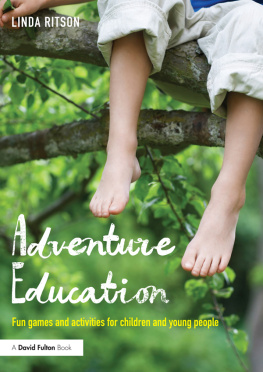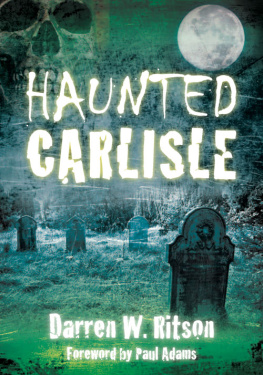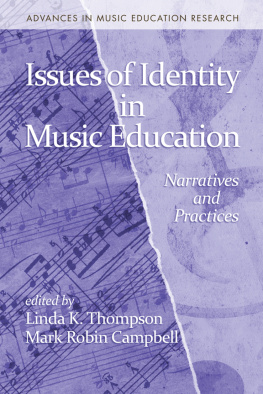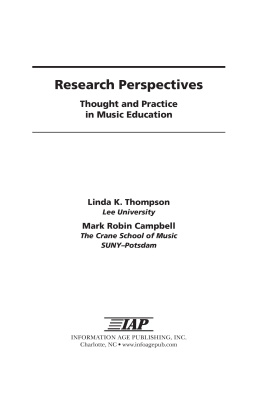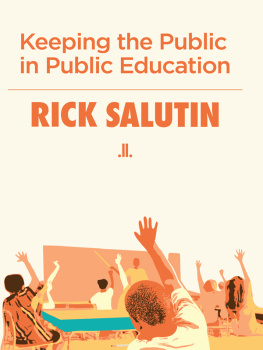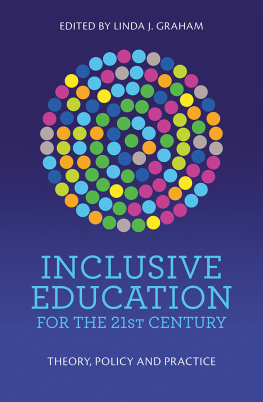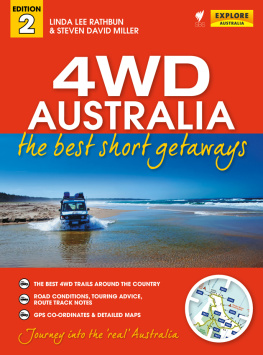Linda Ritson - Adventure Education
Here you can read online Linda Ritson - Adventure Education full text of the book (entire story) in english for free. Download pdf and epub, get meaning, cover and reviews about this ebook. publisher: Routledge, genre: Politics. Description of the work, (preface) as well as reviews are available. Best literature library LitArk.com created for fans of good reading and offers a wide selection of genres:
Romance novel
Science fiction
Adventure
Detective
Science
History
Home and family
Prose
Art
Politics
Computer
Non-fiction
Religion
Business
Children
Humor
Choose a favorite category and find really read worthwhile books. Enjoy immersion in the world of imagination, feel the emotions of the characters or learn something new for yourself, make an fascinating discovery.
- Book:Adventure Education
- Author:
- Publisher:Routledge
- Genre:
- Rating:4 / 5
- Favourites:Add to favourites
- Your mark:
- 80
- 1
- 2
- 3
- 4
- 5
Adventure Education: summary, description and annotation
We offer to read an annotation, description, summary or preface (depends on what the author of the book "Adventure Education" wrote himself). If you haven't found the necessary information about the book — write in the comments, we will try to find it.
Adventure Education — read online for free the complete book (whole text) full work
Below is the text of the book, divided by pages. System saving the place of the last page read, allows you to conveniently read the book "Adventure Education" online for free, without having to search again every time where you left off. Put a bookmark, and you can go to the page where you finished reading at any time.
Font size:
Interval:
Bookmark:
First published 2016
by Routledge
2 Park Square, Milton Park, Abingdon, Oxon OX14 4RN
and by Routledge
711 Third Avenue, New York, NY 10017
Routledge is an imprint of the Taylor & Francis Group, an informa business
2016 Linda Ritson
The right of Linda Ritson to be identified as author of this work has been asserted by her in accordance with sections 77 and 78 of the Copyright, Designs and Patents Act 1988.
All rights reserved. No part of this book may be reprinted or reproduced or utilised in any form or by any electronic, mechanical, or other means, now known or hereafter invented, including photocopying and recording, or in any information storage or retrieval system, without permission in writing from the publishers.
Trademark notice: Product or corporate names may be trademarks or registered trademarks, and are used only for identification and explanation without intent to infringe.
British Library Cataloguing in Publication Data
A catalogue record for this book is available from the British Library
Library of Congress Cataloging-in-Publication Data
Names: Ritson, Linda, author.
Title: Adventure education : fun games and activities for children and young people
/ Linda Ritson.
Description: New York, NY : Routledge, 2016. | Includes index.
Identifiers: LCCN 2015047920| ISBN 9781138119956 (hardback) | ISBN
9781138119963 (pbk.) | ISBN 9781315652016 (ebook)
Subjects: LCSH: Activity programs in educationGreat Britain. | Educational
gamesGreat Britain. | Adventure gamesGreat Britain.
Classification: LCC LB1027.25 .R58 2016 | DDC 371.30941dc23
LC record available at http://lccn.loc.gov/2015047920
ISBN: 978-1-138-11995-6 (hbk)
ISBN: 978-1-138-11996-3 (pbk)
ISBN: 978-1-315-65201-6 (ebk)
Typeset in Optima
by FiSH Books Ltd, Enfield

Everyone is a genius. But if you judge a fish by its ability to climb a tree, it will live its whole life believing that it is stupid.
(Attributed to Albert Einstein)
We all know that were different from everyone else were individuals and not like everyone around us so it follows that we will all learn in different ways. Yet when we start school there is the one single method of teaching, which doesnt suit everyone; we simply arent biologically wired to sit at a desk and listen to a teacher, absorbing and understanding what is being talked at us. A mechanic doesnt learn how to fix cars by listening or reading a book, nor does a hairdresser, a computer programmer, a doctor or a solicitor; there comes a point where the theory has been covered and the learner has to go out and learn by doing, practically putting into use that which they have read and heard. The same goes for school learning. There is a definite place for classroom learning, but subjects and concepts are more meaningful if the learner can get hands on, putting them into practice for themselves, perhaps making mistakes and working things through for themselves.
This book is aimed primarily at educators, with the ambition to encourage them to externalise the classroom and develop lessons that are beyond the chalk and talk of tradition. In National Curriculum terms, I see this book as being of principal interest to educators at Key Stages 1 and 2, primarily because there is greater use of external providers at Key Stage 3 and above. However, Part II (the toolkit) is of potential interest to anyone looking for inspiration to add that extra element to their programme that will enthuse and invigorate their learning audience.
Card games
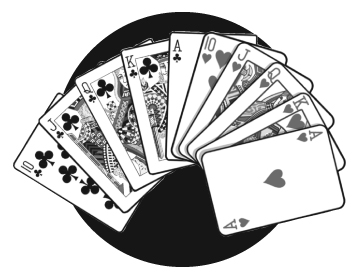
Card games are excellent for helping with number skills and memory, or are simply a way to encourage a group to communicate and work together when they cant be outside. A deck of cards has easily as much developmental potential for group work as outdoor and higher risk, more adventurous activities; physical ability is irrelevant when playing card games, so groups with a wide range of abilities can work together. Card games refine mental skills like logic, observation and memory, as well as encouraging players to communicate, strategise and make decisions.
If the group has visual issues (or just because you can!), you can get decks of large playing cards, which can make it easier for the group.
Card games represent psychological adventure, a different way of working with numbers and visual acuity, still involving decision-making and strategising.
Deal five cards to each player, then place the remainder of the cards face down in the middle. The players may look at their cards.
The dealer starts by putting down a card as a starting suit. Going clockwise, the next player has to follow suit, put down a card of the same denomination or put down one of the special cards in the list below, which affects the next person. If a person is unable to put any card down they must pick a card up from the remaining pile and play goes onto the next player:
- 2 = pick up two cards.
- 3 = pick up three cards.
- 7 = reverse go.
- 8 = next person miss a go.
- Ace = pick up the pile.
Deal eight cards or less to each player, then place the remainder of the cards face down in the middle. The players may look at their cards.
The dealer starts by putting down a card as a starting suit. Going clockwise, the next player has to follow suit, put down a card of the same denomination or put down one of the special cards (below) which affects the next person. If a person is unable to put any card down they must pick a card up from the remaining pile and play goes onto the next player:
- 8 = miss a go.
- 2 = pick up two cards from the remaining pile.
- Jack = pick up one card from the remaining pile.
- Queen = reverse order of play.
- King = change suit to one of the players choosing.
The object of the game is for a player to get rid of all the cards in their hand. Anyone with only one card left has to knock on the table or face a forfeit.
If a large number is playing, you may want to combine two or more packs of cards.
Deal out all the cards in the pack. The object of the game is for a player to get rid of all their cards, but in order to do so they have to discard cards face down into a central pile, in multiples of the same rank (that is two kings, four 10s, three 4s). However, each player chooses whether to be truthful or whether to cheat when they put their cards down (for example, they could say they are putting down three aces when they are putting down a random combination of cards, like a 2, a 3 and a 9). The other players must decide if theyre telling the truth or not and can call cheat if they think that they are not putting down the cards they say.
If a player is caught cheating, they have to pick up the cards they have just put down and the rest of the pile. If someone calls cheat and they were not cheating, they turn over the cards they just put down to prove it and the person who accused them of cheating has to pick up the pile of cards.
Play continues until one player gets rid of all their cards.
Spread a pack of cards face up on the floor or a table. One person is the caller and sits with their back to the cards and players. The caller, working through a separate pack, shouts out a card. The players scan the cards on the floor or table for it. The first player to spot it places a forefinger on it and begins dragging it back to their place. Of course, as soon as their finger lands on the card, many will join it, all determined to get it to their place.
Font size:
Interval:
Bookmark:
Similar books «Adventure Education»
Look at similar books to Adventure Education. We have selected literature similar in name and meaning in the hope of providing readers with more options to find new, interesting, not yet read works.
Discussion, reviews of the book Adventure Education and just readers' own opinions. Leave your comments, write what you think about the work, its meaning or the main characters. Specify what exactly you liked and what you didn't like, and why you think so.

